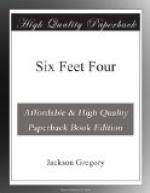“Part greyhound and part steam engine and part devil!” Thornton muttered with vast approval shining in his eyes. “And all horse! A man could ride you right through hell, Little Horse, and come out the other side and never smell your hair burn!”
He drew saddle and bridle from the animal he had been riding and turned it loose. Then coiling his rope as he went, he came up to Comet’s high-lifted head. With much evident distaste but with what looked like too much pride to struggle in an encounter in which he knew that he was to be overcome, the big grey accepted the hard Spanish bit. He allowed, too, the saddle to be thrown on him, only a quick little quivering of the tense flanks and a twitching of the skin upon his back showing that he felt and resented. And then with his master’s weight upon him, his master’s softened voice in his ear, a hard hand very gently stroking the hot shoulder, Comet shook his head, a great sigh expanded the deep lungs, and he was the perfect saddle horse with too much sense to rebel further at the knowledge that after all he is a horse and the man who bestrides him is a man. And Buck Thornton, because he knew this animal and loved him, slackened the reins a little, sensed the tensing of the powerful muscles slipping like pliant steel through satin sheaths, turned the proud head toward the south and felt the rush of air whipping back his hat brim, stinging his face as they shot out across the rolling hills.
When Comet had had his run, racing through the other herds that flung up their heads to look at him and the first half mile had sped away behind, Thornton coaxed him down into a gentle gallop, swearing at him with much soft and deep affection.
“Easy, Little Horse,” he soothed. “Easy. We’re going to Dead Man’s. We’ll go in slow and watching where we put our feet, all rested and quick on the trigger and ready to come out ... if we want to! ... like winning a race.”
And Comet, snorting his dislike of any conservation of strength and energy, nevertheless obeyed. So it was a little after three o’clock when they entered the crooked, narrow street which gives a bad town a bad name.
The town had shaken off the lethargy of its morning sleep: there were many men in the street, some riding back and forth, disdaining to walk the distance of a hundred yards from a saloon they had just left to the saloon to which they were going, some sitting their horses in the shade, lounging in the saddle as a man may lounge in an arm chair, some idled on foot at the swinging doors, while many others made a buzz of deep throated voices at the bars and over the gaming tables. As Buck Thornton, riding slowly, his hat back upon his head, his eyes ranging to right and left, came into the street where Winifred Waverly had entered it last week, more than one man lifted his eyebrows on seeing him and wondered what business had brought him here. For the memory of his meeting with the Bedloes was still green, the scars which the Kid wore on his right wrist and his left arm were still fresh, and this town was the Bedloes’ town in more ways than one.




